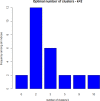Emotional dysregulation subgroups in patients with adult Attention-Deficit/Hyperactivity Disorder (ADHD): a cluster analytic approach - PubMed (original) (raw)
Emotional dysregulation subgroups in patients with adult Attention-Deficit/Hyperactivity Disorder (ADHD): a cluster analytic approach
Oliver Hirsch et al. Sci Rep. 2019.
Abstract
Emotion regulation deficits (ERD) are evident in about 34-70% of the adults with ADHD. In contrast to this, they are not considered in the diagnostic criteria of the disorder. In a recent study of our research group using confirmatory factor analysis, we modeled positive and negative emotion as well as emotion regulation skills along with the classical ADHD-core symptoms. We showed that negative affect and the failure to apply adaptive emotion regulation skills were distinct and indicative dimensions in adult ADHD. In this study, we used a person-centered approach based on cluster analysis to subtype patients on the presence or relative absence of ERD. This results in important information to individualize treatment decisions. We found two clusters, with cluster 2 showing high ERD that were associated with higher impairments indicated by depressive mood, negative affect and elevated psychological distress. There were also higher rates of comorbidity in cluster 2 such as somatoform disorders which were associated with ERD. Women were overrepresented in this cluster 2. Neuropsychological variables did not contribute significantly to cluster formation. In conclusion, ADHD in adults is a heterogeneous disorder with specific subgroups that need differential treatment approaches.
Conflict of interest statement
The authors declare no competing interests.
Figures
Figure 1
Optimal number of clusters in k means determined by R package NbClust.
Similar articles
- [Is emotional dysregulation a component of attention-deficit/hyperactivity disorder (ADHD)?].
Villemonteix T, Purper-Ouakil D, Romo L. Villemonteix T, et al. Encephale. 2015 Apr;41(2):108-14. doi: 10.1016/j.encep.2013.12.004. Epub 2014 Apr 1. Encephale. 2015. PMID: 24703785 French. - Attention-Deficit/Hyperactivity Disorder (ADHD) and Emotion Regulation Over the Life Span.
Christiansen H, Hirsch O, Albrecht B, Chavanon ML. Christiansen H, et al. Curr Psychiatry Rep. 2019 Mar 2;21(3):17. doi: 10.1007/s11920-019-1003-6. Curr Psychiatry Rep. 2019. PMID: 30826879 Review. - Emotional dysregulation is a primary symptom in adult Attention-Deficit/Hyperactivity Disorder (ADHD).
Hirsch O, Chavanon M, Riechmann E, Christiansen H. Hirsch O, et al. J Affect Disord. 2018 May;232:41-47. doi: 10.1016/j.jad.2018.02.007. Epub 2018 Feb 13. J Affect Disord. 2018. PMID: 29477097 - Practitioner Review: Emotional dysregulation in attention-deficit/hyperactivity disorder - implications for clinical recognition and intervention.
Faraone SV, Rostain AL, Blader J, Busch B, Childress AC, Connor DF, Newcorn JH. Faraone SV, et al. J Child Psychol Psychiatry. 2019 Feb;60(2):133-150. doi: 10.1111/jcpp.12899. Epub 2018 Apr 6. J Child Psychol Psychiatry. 2019. PMID: 29624671 Review. - Emotion dysregulation in adult ADHD: Introducing the Comprehensive Emotion Regulation Inventory (CERI).
Thorell LB, Tilling H, Sjöwall D. Thorell LB, et al. J Clin Exp Neuropsychol. 2020 Sep;42(7):747-758. doi: 10.1080/13803395.2020.1800595. Epub 2020 Aug 12. J Clin Exp Neuropsychol. 2020. PMID: 32787552
Cited by
- Emotional dysregulation and health related quality of life in young adults with ADHD: a cross sectional study.
Ben-Dor Cohen M, Eldar E, Maeir A, Nahum M. Ben-Dor Cohen M, et al. Health Qual Life Outcomes. 2021 Dec 20;19(1):270. doi: 10.1186/s12955-021-01904-8. Health Qual Life Outcomes. 2021. PMID: 34930314 Free PMC article. - Attention Deficit Hyperactivity Disorder And Borderline Personality Disorder In Adults: A Review Of Their Links And Risks.
Weiner L, Perroud N, Weibel S. Weiner L, et al. Neuropsychiatr Dis Treat. 2019 Nov 8;15:3115-3129. doi: 10.2147/NDT.S192871. eCollection 2019. Neuropsychiatr Dis Treat. 2019. PMID: 31806978 Free PMC article. Review. - Inflammation and emotion regulation: a narrative review of evidence and mechanisms in emotion dysregulation disorders.
Petruso F, Giff AE, Milano BA, De Rossi MM, Saccaro LF. Petruso F, et al. Neuronal Signal. 2023 Nov 15;7(4):NS20220077. doi: 10.1042/NS20220077. eCollection 2023 Dec. Neuronal Signal. 2023. PMID: 38026703 Free PMC article. Review. - ADHD symptom profiles, intermittent explosive disorder, adverse childhood experiences, and internalizing/externalizing problems in young offenders.
Barra S, Turner D, Müller M, Hertz PG, Retz-Junginger P, Tüscher O, Huss M, Retz W. Barra S, et al. Eur Arch Psychiatry Clin Neurosci. 2022 Mar;272(2):257-269. doi: 10.1007/s00406-020-01181-4. Epub 2020 Aug 11. Eur Arch Psychiatry Clin Neurosci. 2022. PMID: 32780159 Free PMC article. - Evidence of emotion dysregulation as a core symptom of adult ADHD: A systematic review.
Soler-Gutiérrez AM, Pérez-González JC, Mayas J. Soler-Gutiérrez AM, et al. PLoS One. 2023 Jan 6;18(1):e0280131. doi: 10.1371/journal.pone.0280131. eCollection 2023. PLoS One. 2023. PMID: 36608036 Free PMC article.
References
- Stemmler, G. Schmidt-Atzert, L. & Peper, M. Emotionspsychologie. Ein Lehrbuch [Psychology of Emotions. A Textbook.]. 2nd ed. (W. Kohlhammer Verlag, s.l. 2014).
- Gross JJ, Jazaieri H. Emotion, Emotion Regulation, and Psychopathology. Clinical Psychological Science. 2014;2:387–401. doi: 10.1177/2167702614536164. - DOI
- Gross JJ. The Extended Process Model of Emotion Regulation: Elaborations, Applications, and Future Directions. Psychological Inquiry. 2015;26:130–137. doi: 10.1080/1047840X.2015.989751. - DOI
MeSH terms
LinkOut - more resources
Full Text Sources
Medical
